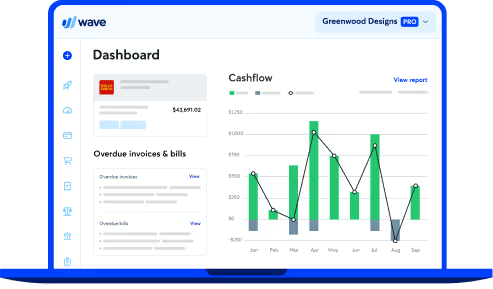
11 small business banking terms you need to know
It’s important to set up your business bank account to make it easier to stay profitable. But just over a quarter of small businesses don’t even separate their personal finances from their business finances—though nearly a quarter believe this is their biggest bookkeeping challenge.
So, aside from getting a dedicated business bank account, what do you need to know to ensure you’re effectively managing your business finances going forward? We built a glossary of small business banking terms to help you get started.
Account minimums
An account minimum refers to the smallest amount of money you’re allowed to have in your associated account. Typically, this amount is between $500 and $5,000 for a business bank account. This is hefty for entrepreneurs who’ve yet to get a firm grip on their cash flow.
If you don’t reach your account minimum you may be charged additional fees, be deemed unqualified for the account, or face account closures. Small businesses should look for business bank accounts that offer no account minimums, so you’re not wasting early profits on unnecessary bank fees.
ACH transfers
Automatic Clearing House (ACH) transfers, or bank payments, are digital transactions where money is taken directly from a customer’s bank account and deposited into another bank account. It’s essentially a digital version of the traditional paper check, making moving money simpler and easier online transactions for customers who don’t have or want to use a credit or debit card.
These digital transactions must go through the ACH, so it typically takes longer to clear than a card transaction–usually 2-7 days. You can offer customers the option to pay via ACH transfer with an online invoicing tool like Wave.
Built-in bookkeeping
Built-in bookkeeping is when banking/accounting products and services automatically sync banking transactions with bookkeeping records.
Unless you started a bookkeeping business, this likely isn’t what you want to spend your time doing. And it’s easy to make bookkeeping mistakes in the midst of launching a business. Small business accounting is a lot easier when you use providers that offer built-in bookkeeping because you don’t have to manually export and manage the data. Instead, you can pull reports, see your cash flow, and be ready to file taxes at any time.
Cash flow
Cash flow refers to the total amount of money coming in and going out of your business.
Cash flow reporting
Cash flow reporting shows different perspectives of your cash flow. For example, a cash flow statement doesn’t account for unpaid or unsent invoices.
There are a few ways to calculate and report on cash flow:
- Operating cash flow formula
- Levered free cash flow formula
- Unlevered free cash flow formula
- Free cash flow formula
- Net cash flow formula
You can also use our free cash flow calculator.
FDIC (insurance)
FDIC stands for Federal Deposit Insurance Corporation and “is an independent agency created by Congress to maintain stability and public confidence in the nation’s financial system.” They do the following:
- Insure deposits
- Screen and monitor financial institutions for ethical business practices and customer protection
- Make large and complex financial institutions resolvable
- Manage receiverships
It’s always a good idea to sign up for a business bank account that is FDIC insured, so that you have the benefits of their protections.
Fee
Fees are additional charges you must pay for bank products and services. One report from ACI Payments found the average amount of bank fees paid by a small business totals more than $450 per year. Many traditional banks apply fees, though they lure small business owners in with a promise of no initial fees, only to hit them later with other charges. Fees are best avoided because they cut into your bottom line.
There are many types of fees:
- Account fee: These are usually applied monthly or annually. This is the baseline price you pay for the account.
- Application fee: This may be charged when you apply to open your business bank account. This is a one-time fee for processing your application.
- Deposit fee: Some banks charge a fee each time you deposit money into your account. This motivates SMBs to hold onto cash longer, which can also lead to more spending and less saving and reinvesting.
- Service fee: Service fees are typically applied to specific actions or circumstances, such as making a withdrawal at an out-of-network ATM or not maintaining the minimum balance. You might also see these referred to as usage fees, maintenance fees, or customer service fees.
- Transfer fee: A transfer fee may be charged when you move funds between different accounts.
Instant payouts
Instant Payouts can push funds from a payment you receive to your bank account via your Visa or Mastercard debit card so you receive the money nearly instantly, even on evenings, weekends, and holidays. Instant payouts often come with an extra processing fee.
This option is important to look for, especially when funds are tight, as you need fast access to your cash to keep the lights turned on. Bear in mind, 82% of small businesses fail because of cash flow problems.
Manual bookkeeping
While built-in bookkeeping is done for you by software, manual bookkeeping is done by hand. Since 75% of US-based SMBs manage their finances without an accountant on staff, there’s a lot of manual bookkeeping out there. Many business owners use spreadsheets to conduct manual bookkeeping.
But this task is tedious and deflating. It sucks the passion from your work and slows your business down because you don’t have real-time information at the ready. It also makes your records more susceptible to human error, which can harm your business’s financial health and ability to make a profit.
Mobile check deposit
Mobile check deposit is when you can take a photo of a paper check and use your bank’s mobile app to upload the image and deposit the funds into your account. Just like any paper check deposit, these transactions typically take a few days to go through. This eliminates the need to visit the bank or an ATM and makes it easier to get your money.
Overdraft
Overdraft is when you’ve spent more money than you have in your account. The cardholder’s bank may extend a line of credit to allow a transaction to go through, or it may otherwise be declined. Many financial institutions charge fees when you overdraft your account.
(and create unique links with checkouts)
*While subscribed to Wave’s Pro Plan, get 2.9% + $0 (Visa, Mastercard, Discover) and 3.4% + $0 (Amex) per transaction for the first 10 transactions of each month of your subscription, then 2.9% + $0.60 (Visa, Mastercard, Discover) and 3.4% + $0.60 (Amex) per transaction. Discover processing is only available to US customers. See full terms and conditions for the US and Canada. See Wave’s Terms of Service for more information.
The information and tips shared on this blog are meant to be used as learning and personal development tools as you launch, run and grow your business. While a good place to start, these articles should not take the place of personalized advice from professionals. As our lawyers would say: “All content on Wave’s blog is intended for informational purposes only. It should not be considered legal or financial advice.” Additionally, Wave is the legal copyright holder of all materials on the blog, and others cannot re-use or publish it without our written consent.


























